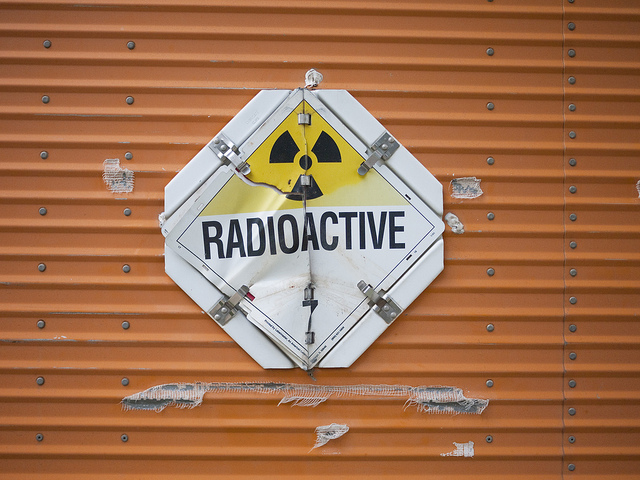later post | index | earlier post
What to do with radioactive scrap metal
Friday, 28 February 2025

Scrap metal should always be handled with care during the recycling process, regardless of whether it appears to be dangerous or not. If you are ever unsure of what to do, call an expert.
Typically, most household scrap metal items are not hazardous, and you’ll be able to follow standard recycling processes to dispose of them. However, occasionally you may come across scrap metal which has been impacted by radioactive materials (such as microwaves).
Generally speaking, these radioactive scrap metals won’t be in a typical household. If they do occur, they are in very small quantities or in uninhabited older properties. There are also dedicated professionals who will process the radioactive scrap metal and handle their disposal for you.
Occasionally some radioactive material may be found on a vehicle. At ASM Metal Recycling we have radiation detector units, which all vehicles must drive through to test if the material onboard is radioactive. If the detector alarm sounds, we send the vehicle through several more times in case of a false positive.
We also have a Geiger meter that can find the precise piece that has triggered the detectors. Any pieces that are found are always safely disposed of. All of this ensures we do not send on radioactive material to be recycled.
Where can radioactive substances be found?
Some of the main sources for radioactive scrap metal in the metal recycling world include:
‘Orphan’ sources: Typically, these are redundant industrial equipment, like gauges or medical equipment, which will contain some radioactive elements. These sources are usually found out of regulatory control but are generally rare.
Naturally Occurring Radioactive Material (NORM): NORM sources generally contain uranium-238 and thorium-232 and their associated radioactive decay products. Examples of NORM materials that you may occasionally come across in radioactive scrap metal include zircon sands or refractory materials.
Low Specific Activity (LSA) scale: LSA scale radioactive decay products can accumulate on the inside of items from machines involved in certain chemical processes, such as old piping. LSA decay can also occur in items from the oil and gas industry. They can also be found in various alloys like welding equipment that contain natural thorium and consequently radioactive thorium.
Imported steel: More recently there have been incidents where steel that has been imported into the UK has contained radioactive material, due to an orphan source being melted with the steel during the production process.
Nuclear material: Again, generally not found in or around the home, but any items involved in a nuclear supply chain may also contain radioactive material.
How can I identify radioactive scrap metal?
It is impossible for humans to detect ionising radiation. But, if you come across something with the international symbol for radiation (a yellow triangle with a black pictogram), you should behave as if it is radioactive until confirmed otherwise.
What do you do if you find radioactive metal?
In the unlikely event that you do find something you think is radioactive, the most important thing is not to touch it. Instead, move well away from the area and call emergency services. They will be able to escalate your concerns to professionals trained to process and handle radioactive materials.
What happens if you touch radioactive metal?
Radioactive sources should never encounter bare skin directly. If the radiation source is intense, it can cause burns. If handling a radioactive substance is unavoidable, then the minimum protection required is gloves and tongs.
Can you destroy radioactive material?
It is possible to decontaminate some high-value radioactive scrap metal, but ideally this should be done before it reaches the scrap yard.
What is the process for managing a radioactive substance?
Any processor will have their own due process to handle radioactive scrap metal. This will usually include:
- Running the radioactive scrap metal through a monitor to confirm the presence of radioactive materials
- Isolating the radioactive metal in the designated position
- Analysing the item using a hand-held gamma dose rate meter to establish if it’s safe to approach whilst cordoning off the area
- Getting in touch with the radiation protection adviser (RPA) to seek further advice about handling, storing, and disposing of the contaminated items or area
- Informing the local Environment Agency and the Health and Safety Executive
Remember, finding radioactive metal is extremely rare
As a rule, radioactive doses found in the home rarely occur, and when they do, it is in very small amounts. You can always get in touch if you’re concerned about a particular item around the home. If you have any questions about metal recycling, construction waste management or disposing of a particular metal, contact ASM Metal Recycling today.
later post | index | earlier post
Recent posts
- What is commercial waste?
- What are different metals used for?
- What to do with radioactive scrap metal
- How does metal recycling benefit the economy and the environment?
- 5 common metals that can be recycled
- How does metal recycling work?
- How to Sort Metal for Scrap
- How to classify the different types of waste your business produces
- What is WEEE waste?
- Can iron be recycled in the UK?
- What has the most copper in it to scrap?
- How to better understand scrap metal pricing
- Is there a link between copper and brass prices?
- How to make money from cable scrap
- How many different types of copper are there?